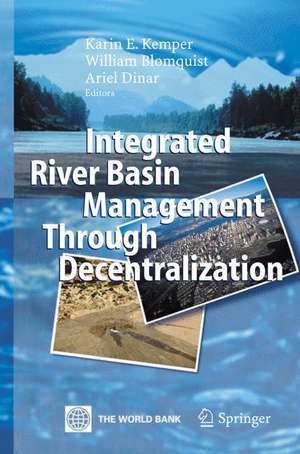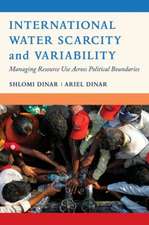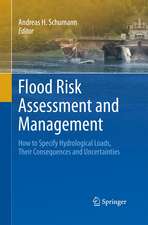Integrated River Basin Management through Decentralization
Editat de Karin Kemper, William Blomquist, Ariel Dinaren Limba Engleză Hardback – 12 dec 2006
| Toate formatele și edițiile | Preț | Express |
|---|---|---|
| Paperback (1) | 944.19 lei 6-8 săpt. | |
| Springer Berlin, Heidelberg – 11 feb 2010 | 944.19 lei 6-8 săpt. | |
| Hardback (1) | 950.96 lei 6-8 săpt. | |
| Springer Berlin, Heidelberg – 12 dec 2006 | 950.96 lei 6-8 săpt. |
Preț: 950.96 lei
Preț vechi: 1159.71 lei
-18% Nou
Puncte Express: 1426
Preț estimativ în valută:
181.99€ • 189.30$ • 150.24£
181.99€ • 189.30$ • 150.24£
Carte tipărită la comandă
Livrare economică 12-26 aprilie
Preluare comenzi: 021 569.72.76
Specificații
ISBN-13: 9783540283546
ISBN-10: 3540283544
Pagini: 262
Ilustrații: XXI, 262 p.
Dimensiuni: 155 x 235 x 25 mm
Greutate: 0.6 kg
Ediția:2007
Editura: Springer Berlin, Heidelberg
Colecția Springer
Locul publicării:Berlin, Heidelberg, Germany
ISBN-10: 3540283544
Pagini: 262
Ilustrații: XXI, 262 p.
Dimensiuni: 155 x 235 x 25 mm
Greutate: 0.6 kg
Ediția:2007
Editura: Springer Berlin, Heidelberg
Colecția Springer
Locul publicării:Berlin, Heidelberg, Germany
Public țintă
ResearchDescriere
Drawing upon a worldwide survey of river basin organizations and in-depth studies of eight river basins in a variety of locations around the globe, this book examines how institutional arrangements for managing water resources at the river-basin level have been designed and implemented, what the impetus for these arrangements has been, and what institutional features appear to be associated with greater or lesser success in river basin management.
Cuprins
1. River basin management at the lowest appropriate level: When and why does it (not) work in pracitave? - 2. Comparative analysis of case studies.- 3. Determinants of river basin management decentralization: Motivation, process, and performance.- 4. Australia: Murray-Darling basin.- 5. Brazil: Alton Tietê basin.- 6. Brazil: Jaguaribe basin.- 7. Canada: Fraser basin.- 8. Costa Rica: Tárcoles basin.- 9. Indonesia: Brantas basin.- 10. Poland: Warta basin.- 11. Spain: Guadalquivir basin.- 12. River basin management: Conclusions and implications.
Recenzii
From the reviews:
"This 12-chapter book provide an overview, a summary of the comparative analysis of eight case studies, and a summary of determinants of decentralized water management. … The book is edited and in part written by three recognized experts in institutional development and water management. … the book and underlying analytical framework are comprehensive and a must read for those interested in understanding the dynamics of decentralization, increased participation, and role of integration in progressive, modern water management."(Matthew D. Davis, Eos, Vol. 89 (48), November, 2008)
"This 12-chapter book provide an overview, a summary of the comparative analysis of eight case studies, and a summary of determinants of decentralized water management. … The book is edited and in part written by three recognized experts in institutional development and water management. … the book and underlying analytical framework are comprehensive and a must read for those interested in understanding the dynamics of decentralization, increased participation, and role of integration in progressive, modern water management."(Matthew D. Davis, Eos, Vol. 89 (48), November, 2008)
Notă biografică
Karin Kemper: Senior Water Resources Management Specialist, South Asia Environment and Social Unit, the World Bank, with research and project experience in Latin America and Asia and a number of publications in institutional economics relating to water resources management.
William Blomquist: Associate Professor of Political Science, Indiana University, Purdue Indianapolis, with research and consulting experience on water resource planning and policy and on institutions of water resource management.
Ariel Dinar: Lead Economist, Agriculture ad Rural Development Department, The World Bank and Professional Lecturer of International Relations - Energy, Environment, Science and Technology, School of Advanced International Studies, Johns Hopkins University, Washington, DC, USA.
William Blomquist: Associate Professor of Political Science, Indiana University, Purdue Indianapolis, with research and consulting experience on water resource planning and policy and on institutions of water resource management.
Ariel Dinar: Lead Economist, Agriculture ad Rural Development Department, The World Bank and Professional Lecturer of International Relations - Energy, Environment, Science and Technology, School of Advanced International Studies, Johns Hopkins University, Washington, DC, USA.
Caracteristici
Examines how institutional arrangements for managing water resources at the river basin level have been designed and implemented


















